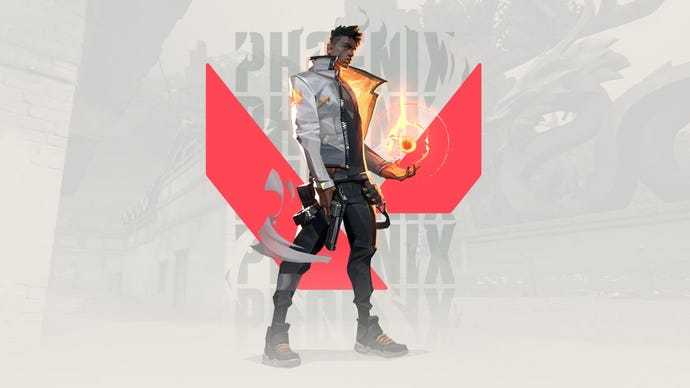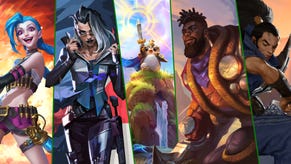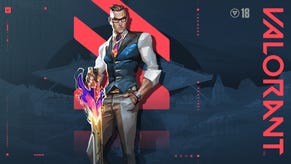Valorant Isn't Trying to Appeal to Everyone
Valorant's take on the genre is anything but diluted, and that's a good thing.
This article first appeared on USgamer, a partner publication of VG247. Some content, such as this article, has been migrated to VG247 for posterity after USgamer's closure - but it has not been edited or further vetted by the VG247 team.
Shooters have come and gone out of fashion, but few have ever been able, or even tried, to topple Counter-Strike. There are hero-based games, faster and more arcade-y efforts, arenas and flags, but Counter-Strike remains the master of its domain: Two sides, two teams, one bomb, and a lot of corner-peeking and headshots.
Riot Games is looking to change that. Valorant is one of several new games being developed by the League of Legends studio, intended to put the "S" in Riot Games. More than other efforts like card game Legends of Runeterra, Valorant stands alone. It has no basis in Runeterra, the world of League of Legends, so it's not building off the inherent popularity of League.
But unlike Counter-Strike, or another modern analogue, Rainbow Six Siege, Valorant isn't coated in a military facade. It's not emulating war games. The lore of Valorant is fairly open to interpretation right now, but it has layers of style to it; a highlight video for Korean speedster Jett's abilities posted yesterday was backed by a thumping Doja Cat jam.
Valorant is steeped in a level of style and personality that most modern tactical shooters aren't. It's not as huge of a visual leap as Splatoon, but the idea of putting hero-style Agents into a Counter-Strike setting works wonders for Valorant. Joe Ziegler, game director of Valorant at Riot Games, told me that as the team developed various characters and abilities, it became clear that it would need a creative space to work outside a militarized standard.
"The art style of Valorant was ultimately a very important piece that married a lot of the goals we wanted to achieve with and alongside the gameplay," Ziegler says. "It resolved creatively eclectic elements, such as fireballs and guns, while ensuring visual clarity and the ability to identify your opponents, supporting performance on a wide variety of hardware, and enhancing exciting moments that naturally occurred in matches."
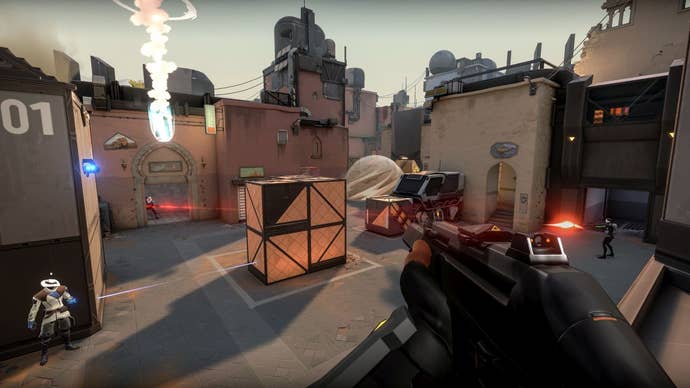
Without the world of Runeterra, Valorant stands alone. League of Legends has made a significant point of building out its League universe, reaching a breadth of people with everything from Teemo hats to 2018's POP/STARS single, a K-pop crossover that's garnered hundreds of millions of views.
Valorant will only benefit in a tangential way from all that heat. When asked why Valorant isn't set in the world of League of Legends or tied into it in some way, Ziegler says the team actually toyed with the idea for some a while, but found it difficult to reconcile.
"Our game had physical, weighty guns that fired like real life weaponry and our abilities were not designed to dominate the battlefield over these guns," Ziegler says. "In other words, guns were the star of the show and in Runeterra, magic was the star of the show. We didn’t want to do an injustice to fans of the world of League of Legends by forcibly trying to make it conform to our needs."
While all of Riot's other projects stay within the net of Runeterra, Valorant is stepping outside it, and into competition with one of the world's leading esports. Counter-Strike hasn't slowed down for ages, and Valorant is coming into the genre to put its own spin while still emulating that highly identifiable style of shooter.
A Rifle First, Agent Second
The inclusion of abilities is a major leap for Valorant to make. While Rainbow Six Siege has its operators, that game is a little more about verticality and breaching—Valorant's DNA matches closer to Counter-Strike, with angles, hallways, and lanes of traffic to cover. Attackers try to plant a "spike" at one of several sites, while defenders hold them off.
One-shot kills, a round-based economy that meters what kind of equipment you can buy, and even running faster with a knife out all further make Valorant feel familiar to a round of Counter-Strike. Abilities are the top-down twist, a way to take the nameless avatars and give them identity, personality, and even a voice that jokes and jabs at in-game events. Ziegler's crew started the project knowing it wanted to create a tactical shooter. Through various prototypes, abilities became the team's way of providing tools for additional expression and deeper strategies.
At the outset of each Valorant match, every player picks an individual Agent (no stacking one character) who has a slew of active and passive abilities, as well as an ultimate. Some are bought during buy phases, just like guns and equipment, while one "core" ability is available every round regardless of a player's funding. Don't expect them to dominate the game, however. Ziegler says that while iterating on the Agents' abilities over the course of years, there were some rules established to keep them in check and make sure they didn't overpower the actual shooting.
"These rules include ideas, like: making sure abilities are generally a limited and consumable resource, ensuring abilities used haphazardly or callously can create an opportunity for your opponent to capitalize on your vulnerable state, or using abilities predictably can easily be countered," Ziegler says.
To put a fine point on it, this isn't Overwatch or Team Fortress, where characters fit into and fulfill roles. When talking to some of the developers of Valorant over the course of the hands-on session, they stressed that there aren't stringent guidelines for how to play any of Valorant's Agents.
"We don't want roles to be overly prescriptive," said Ryan 'Morello' Scott, character design lead on Valorant, in an AMA. "The game is a lot more sandbox-y than a lot of character games."
Cypher, one of Valorant's more defense-oriented Agents, might be well-suited to holding areas on the map than being the aggressor, but that doesn't mean he couldn't—or shouldn't—be the one surging into a site. An easy example is Sage, one of my favorite Agents I played: ostensibly, Sage is a healer. Her signature ability lets her heal an ally or herself, but that doesn't mean she has to play further back, topping off health bars. Every Agent in Valorant is gun first, hero second.
Ziegler says some ideas were left on the cutting room floor because they detracted from Valorant's core motivations. "There was a point at which we experimented with character-specific guns and we thought that would create team-reliance and strong teamplay," he explains. "But what we actually found is that, for this particular game, this hurt the ability for teams to strategize, since there weren’t enough gameplay decisions to combine to create deep strategies. Instead of empowering teamplay, we had created limitations that hampered creative play."
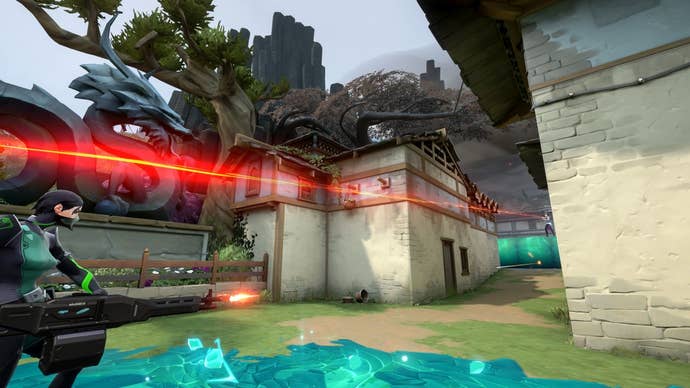
Avoiding the Lowest Common Denominator
There are two fears that can surface around a hardcore competitive game. The first is from those looking in on it from the outside, as people unfamiliar with the genre are worried that they'll never be able to keep up with the seasoned veterans. The second is from those veterans, afraid that the mechanics, depth, and complexities will get smoothed out to attract the newcomers. With Riot Games involved, it's not a huge assumption to think League of Legends fans might be interested in trying Valorant. It'll be free-to-play, and there's a non-zero chance that for some players, Valorant will be their first experience with a tactical shooter.
Ziegler recalls a design phrase he heard when he was younger: "You don't get to pick your player." He says the Valorant team is anticipating an influx of different players, with different backgrounds and levels of experience in the genre.
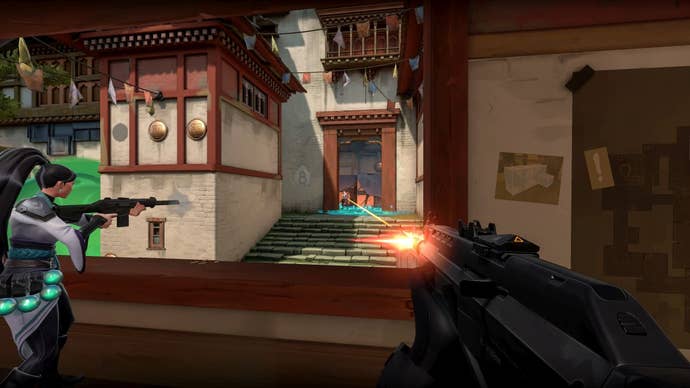
"We’re not a lowest common denominator experience," Ziegler says. "We’ve made our game to scale to high levels of play, and that means introducing layers of complexity and learning even experienced shooter players will have to go through."
Interestingly, Ziegler says the focus of publishing efforts has not been on getting players to play Valorant because it's "cool," but to educate potential players on what kind of experience it will be. The aim is to educate players on the joys of learning and mastering a tactical shooter, as well as dispelling misinformed impressions.
"While we know this game is probably not for everyone, we definitely believe there are a lot of players looking to learn and master a game that challenges your ability to strategize, think and perform and Valorant is here to welcome them," Ziegler says.
There are advantages to creating this hybrid of heroes, abilities, and hardcore tactics. It's easy to speak in the jargon, as games like Overwatch and the surge of esports have made these concepts common nomenclature. It's possible that players are, as Ziegler noted, more open to a more punishing game where one bad peek around a corner leads to a dome-shot from a patient sniper. There are also drawbacks.
"With shooters being one of the staples of online gaming, players come with a variety of expectations around systems that they are used to and it requires us to make hard choices about what gameplay elements we are going to deliver," Ziegler says.
To that end, Valorant's pillars are clear: competitive-oriented gameplay, with a burst of player creativity and expression through abilities. Valorant players will still have to play amateur economist with round purchases and memorize certain callouts, like "B short" or "A long." (In fact, one map will be teaching Counter-Strike veterans some new strategies, as it has three sites to plant on versus the usual two, something that has rarely ever been seen in Counter-Strike.)
Through style and a determination to deliver an experience that's faithful to the hardcore crowd, Valorant is making a play for a share of the tactical shooter genre. It might even pay off.
